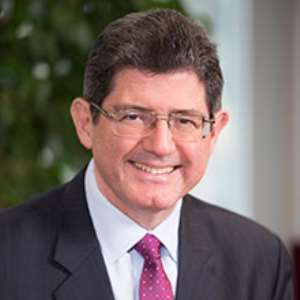
Accra, June 6, GNA - The World Bank Group's (WBG) new Cascade approach aims to systematically connect private financing with high-impact development projects.
Mr Joaquim Levy, the Managing Director and World Bank Group Chief Financial Officer, said: "In most simple terms this approach prescribes that we first consider private investment for projects; then public private partnerships; and if the first two are not available then, only then, consider public finance."
"The Cascade will allow us to spur private investment by supporting business-friendly reforms and regulations and capacity building at the sector and country levels, and developing and applying instruments to crowd-in the private sector to finance development projects in the most challenging sectors and countries."
Mr Levy made these remarks at the Third World Bank Development Finance Forum (DFF) in Accra.
He said it would also ensure that scarce public and concessional finance would not compete with private finance.
He said it would only be used when and where it was absolutely necessary and only to unlock investments and build markets.
He said in line with this approach, the new $ 2.5 billion International Development Association - Private Sector Window (IDA PSW) aims to demonstrate that, if public and concessional finance can be used to create the right risk/return profile for investments, the frontier markets can be investible and profitable.
He said in turn it would break the vicious cycle, encouraging further investment, and eventually creating markets.
"We know that implementing this vision is not going to be easy.
"We will face many challenges and learn by doing," he added.
Mr Levey said: "And knowing that there are good examples ahead of us, such as Ghana, is encouraging.
"That is why it was critical to hold the first African DFF in Accra - the vibrant and business-friendly capital of Ghana."
He explained that this year's DFF was particularly special because it was the first one in Africa.
"And we are delighted to see such an overwhelming interest from the continent in the event," he said.
Mr Levy noted that since 2015, this forum had played a critical role in shaping the development finance dialogue.
He said in Rotterdam, collectively, they laid the groundwork for the Multilateral Development Banks' commitments in the Addis Ababa Action Agenda.
He said once again that there was so much growth potential in Africa.
Adding that yet, this potential was not fully realized because of the many challenges African countries face in attracting investments, which was critical to achieving the Sustainable Development Goals and the WBG's twin goals.
"This is unfortunate, especially because there are large sums of funds in advanced economies which are looking for better long-term investment opportunities," he stated.
He said currently, only a fraction of these funds were channelled towards developing countries, although a significant pipeline of projects, particularly in infrastructure, exists.
Mr Levey said: "We have a huge opportunity here. We can bridge this financing gap, generating development and financial returns for all parties."
"In fact, fostering investment, especially, in 'climate-smart' infrastructure in Emerging Markets and Developing Economies with young demographics can offer high productivity gains and boost investor confidence in developing and advanced countries alike, while also helping countries reduce their carbon print and increase resilience."
GNA
By Iddi Yire, GNA




 'Kill whoever will rig Ejisu by-election' – Independent Candidate supporters inv...
'Kill whoever will rig Ejisu by-election' – Independent Candidate supporters inv...
 Ashanti Region: ‘Apologize to me for claiming I owe electricity bills else... – ...
Ashanti Region: ‘Apologize to me for claiming I owe electricity bills else... – ...
 Ghana is a mess; citizens will stand for their party even if they’re dying — Kof...
Ghana is a mess; citizens will stand for their party even if they’re dying — Kof...
 Internet shutdown an abuse of human rights — CSOs to gov't
Internet shutdown an abuse of human rights — CSOs to gov't
 Free SHS policy: Eating Tom Brown in the morning, afternoon, evening will be a t...
Free SHS policy: Eating Tom Brown in the morning, afternoon, evening will be a t...
 Dumsor: A British energy expert 'lied' Ghanaians, causing us to abandon energy p...
Dumsor: A British energy expert 'lied' Ghanaians, causing us to abandon energy p...
 What a speech! — Imani Africa boss reacts to Prof. Opoku Agyemang’s presentation
What a speech! — Imani Africa boss reacts to Prof. Opoku Agyemang’s presentation
 Dumsor: Tell us the truth — Atik Mohammed to ECG
Dumsor: Tell us the truth — Atik Mohammed to ECG
 Dumsor: Don't rush to demand timetable; the problem may be temporary — Atik Moha...
Dumsor: Don't rush to demand timetable; the problem may be temporary — Atik Moha...
 Space X Starlink’s satellite broadband approved in Ghana — NCA
Space X Starlink’s satellite broadband approved in Ghana — NCA
